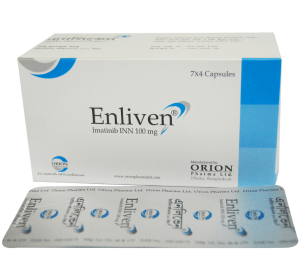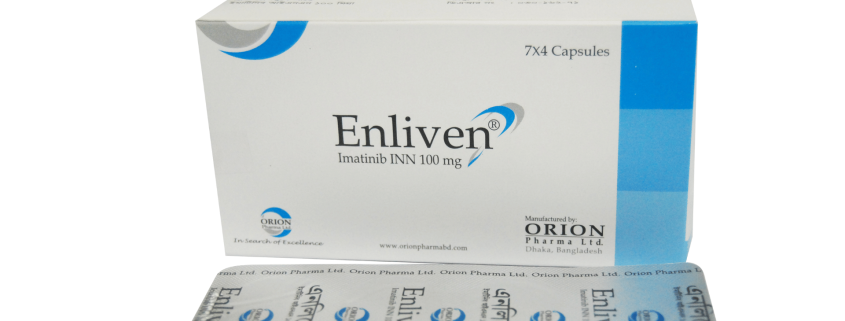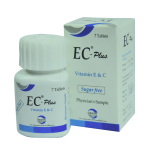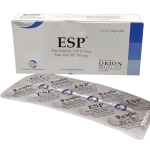Enliven

ANTICANCER: Imatinibe
Indication
Enliven (Imatinib Mesylate) is indicated for the treatment of patients with Philadelphia chromosome positive chronic myeloid leukemia (CML) in blast crisis, accelerated phase, or in chronic phase after failure of interieron-alpha therapy. Enliven is also indicated for the treatment of patients with kit (CDI17) positive unresectable and/ or metastatic malignant gastrointestinal stromal tumors (GIST). The effectiveness of Imatinib is based on overall hematologic and cytogenetic response rates in CML and objective response rate in GIST. There are no controlled trials demonstrating a clinical benefit, such as improvement in disease-related symptoms or increased survival.
Contraindication
Use of Imatinib Mesylate is contraindicated in patients with hypersensitivity of Imatinib.
Dosage & Administration
Therapy should be initiated by a physician experienced in the treatment of patients with chronic myeloid leukemia or gastrointestinal stromal tumors. The prescribed dose should be administered orally, with a meal and a large glass of water. Doses of 400 mg or 600 mg should be administered once daily, whereas a dose of 800 mg should be administered as 400 mg twice a day. Treatment may be continued as long as there is no evidence of progressive disease or unacceptable toxicity. The recommended dosage of Imatinib is 400 mg/day for patients in chronic phase CML and 600 mg/day for patients in accelerated phase or blast crisis. The recommended dosage of Imatinib is 400 mg/day or 600 mg/day for patients with unresectable and/ or metastatic, malignant GIST. In CML, dose increase from 400 mg to 600 mg in patients with chronic phase disease, or from 600 mg to 800 mg (given as 400 mg twice daily) in patients in accelerated phase or blast crisis may be considered in the absence of severe drug reaction and severe non-leukemia related neutropenia or thrombocytopenia in the following circumstances: disease progression (at any time); failure to achieve a satisfactory hematologic response after at least 3 months of treatment; loss of previously achieved hematologic response.
Side Effect
Chronic Myeloid Leukemia: The majority of Imatinib treated patients experienced adverse events at some time. Most events were of mild to moderate grade, but drug was discontinued for adverse events in 2% of patients in chronic phase, 3% in accelerated phase and 5% in blast crisis. The most frequently reported drug-related adverse events were nausea, vomiting, diarrhoea, edema and muscle cramps.
Hematologic Toxicity: Cytopenias and particularly neutropenia and thrombocytopenia, were a consistent finding in all studies, with a higher frequency at doses > 750 mg. The occurrence of cytopenias in CML patients was also dependent on the stage of the disease; with a frequency of grade 3 or 4 neutropenia and thrombocytopenia between 2 and 3 fold higher in blast crisis and accelerated phase compared to chronic phase.
Hepatotoxicity: Severe elevation of transaminases or bilirubin occurred in 1 -4% and were usually managed with dose reduction or interruption (the median duration of these episodes was approximately one week). Treatment was discontinued permanently because of liver laboratory abnormalities in less than 0.5% of patients. However, one patient, who was taking Acetaminophen regularly for fever, died of acute liver failure.
Gastrointestinal Stromal Tumors: The majority of Imatinib treated patients experienced adverse events at some time. The most frequently reported adverse events were edema, nausea, diarrhoea, abdominal pain, muscle cramps, fatigue and rash. Most events were of mild to moderate severity.
Drug Interaction
Drugs that may alter Imatinib plasma concentrations
Drugs that may increase Imatinib plasma concentrations Caution is recommended when administering Imatinib with inhibitors of the CYP3A4 family (e. g. ketoconazole, itrakonazole, erythromycin, clarithromycin). Substances that inhibit the cytochrome P450 isoenzyme (CYP3A4) activity may decrease metabolism and increase Imatinib <- concentrations. There is a significant increase in exposure to Imatinib when Imatinib is co-administered with ketoconazole (CYP3A4 inhibitor).
Drugs that may decrease Imatinib plasma concentrations
Substances that are inducers of CYP3A4 activity may increase metabolism and decrease Imatinib plasma concentrations. Co-medications that induce CYP3A4 (e.g., Dexamethasone, Phenytoin, Carbamazepine, Rifampicin, and Phenobarbital) may reduce exposure to Imatinib.
Drugs that may have their plasma concentration altered by Imatinib
Imatinib increases the mean Cma* and AUC of Simvastatin (CYP3A4 substrate) 2- and 3.5 fold, respectively, suggesting an inhibition of the CYP3A4 by Imatinib. Particular caution is recommended when administering Imatinib with CYP3A4 substrates that have a narrow therapeutic window (e.g., Cyclosporine or Pimozide). Imatinib will increase plasma concentration of other CYP3A4 metabolized drugs (e. g., trizolo-benzodiazempines, Dihydropyridine calcium channel blockers, Certain HMG-CoA reductase inhibitors, etc.) Because Warfarin is metabolized by CYP2C9 and CYP3A4, patients who require anticoagulation should receive low-molecular weight or standard heparin.
Carcinogenesis, Mutagenesis, Impairment of Fertility Carcinogenicity studies have not been performed with Imatinib Mesylate.Positive genotoxic effects were obtained for Imatinib in an in vitro mammalian cell assay (Chinese hamster ovary) for clastogenicity (chromosome aberrations) in the presence of metabolic activation. Two intermediates of the manufacturing process, which are also present in the final product, are positive for mutagenesis in the Ames assay. One of these intermediates was also positive in the taking Imatinib.
Paediatric Use
The safety and effectiveness of Imatinib in paediatric patients have not been established.
Geriatric Use
In the CML clinical studies, approximately 40% of patients were older than 60 years and 10% were older than 70 years.No difference was observed in the safety profile in patients older than 65 years as compared to younger patients, with the exception of a higher frequency of edema. The efficacy of Imatinib was similar in older and younger patients. In the GIST study, 29% of patients were older than 60 years and 10% of patients were older than 70 years. No obvious differences in the safety or efficacy profile were noted in patients older than 65 years as compared to younger patients, but the small number of patients does not allow a formal analysis.
Drug Interactions
Drugs that may alter Imatinib plasma concentrations
Drugs that may increase Imatinib plasma concentrations Caution is recommended when administering Imatinib with inhibitors of the CYP3A4 family (e. g. ketoconazole, itrakonazole, erythromycin, clarithromycin). Substances that inhibit the cytochrome P450 isoenzyme (CYP3A4) activity may decrease metabolism and increase Imatinib <- concentrations. There is a significant increase in exposure to Imatinib when Imatinib is co-administered with ketoconazole (CYP3A4 inhibitor).
Drugs that may decrease Imatinib plasma concentrations
Substances that are inducers of CYP3A4 activity may increase metabolism and decrease Imatinib plasma concentrations. Co-medications that induce CYP3A4 (e.g., Dexamethasone, Phenytoin, Carbamazepine, Rifampicin, and Phenobarbital) may reduce exposure to Imatinib.
Drugs that may have their plasma concentration altered by Imatinib
Imatinib increases the mean Cma* and AUC of Simvastatin (CYP3A4 substrate) 2- and 3.5 fold, respectively, suggesting an inhibition of the CYP3A4 by Imatinib. Particular caution is recommended when administering Imatinib with CYP3A4 substrates that have a narrow therapeutic window (e.g., Cyclosporine or Pimozide). Imatinib will increase plasma concentration of other CYP3A4 metabolized drugs (e. g., trizolo-benzodiazempines, Dihydropyridine calcium channel blockers, Certain HMG-CoA reductase inhibitors, etc.) Because Warfarin is metabolized by CYP2C9 and CYP3A4, patients who require anticoagulation should receive low-molecular weight or standard heparin.
Carcinogenesis, Mutagenesis, Impairment of Fertility Carcinogenicity studies have not been performed with Imatinib Mesylate.Positive genotoxic effects were obtained for Imatinib in an in vitro mammalian cell assay (Chinese hamster ovary) for clastogenicity (chromosome aberrations) in the presence of metabolic activation. Two intermediates of the manufacturing process, which are also present in the final product, are positive for mutagenesis in the Ames assay. One of these intermediates was also positive in the mouse lymphoma assay. Imatinib was not genotoxic when tested in an in vitro bacterial cell assay (Ames test) an in vitro mammalian cell assay (mouse lymphoma) and an in vivo rat micronucleus assay. In a study of fertility, in male rats dosed for 70 days prior to mating testicular and epididymal weights and percent motile sperm were decreased at 60 mg/kg, approximately equal to the maximum clinical dose of 800 mg/day, based on body surface area. This was not seen at dose < 20 mg/kg (one-fourth the maximum human dose of 800 mg). When female rats were dosed 14 days prior to mating and through to gestational day 6, there was no effect on mating or on number of pregnant females. At a dose of 60 mg /kg (approximately equal to the human dose of 800 mg), female rats had significant post implantation fetal loss and a reduced number of live fetuses. This was not seen at doses < 20 mg/kg (one fourth the maximum human dose of 800 mg).
Presentation
Each box contains 7 X 4’s capsules in blister pack



